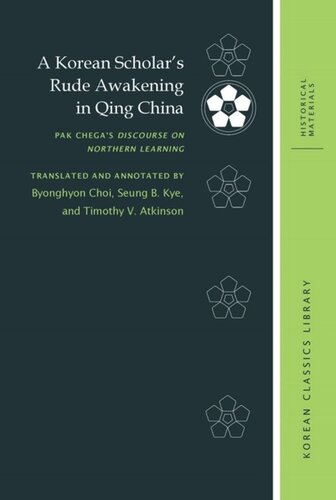

Most ebook files are in PDF format, so you can easily read them using various software such as Foxit Reader or directly on the Google Chrome browser.
Some ebook files are released by publishers in other formats such as .awz, .mobi, .epub, .fb2, etc. You may need to install specific software to read these formats on mobile/PC, such as Calibre.
Please read the tutorial at this link: https://ebookbell.com/faq
We offer FREE conversion to the popular formats you request; however, this may take some time. Therefore, right after payment, please email us, and we will try to provide the service as quickly as possible.
For some exceptional file formats or broken links (if any), please refrain from opening any disputes. Instead, email us first, and we will try to assist within a maximum of 6 hours.
EbookBell Team

4.3
58 reviewsTwo years after Adam Smith’s Wealth of Nations was published in 1776, Pak Chega’s (1750–1805) Discourse on Northern Learning appeared on the opposite corner of the globe. Both books presented notions of wealth and the economy for critical review: the former caused a stir across Europe, the latter influenced only a modest group of Chosŏn (1392–1897) Korea scholars and other intellectuals. Nevertheless, the ideas of both thinkers closely reflected the spirit of their times and helped define certain schools of thought—in the case of Pak, Northern Learning (Pukhak), which disparaged the Chosŏn Neo-Confucian state ideology as inert and ineffective.
Years of humiliation and resentment against the conquering Manchus blinded many Korean elites to the scientific and technological advances made in Qing China (1644–1911). They despised its rulers as barbarians and begrudged Qing China’s status as their suzerain state. But Pak saw Korea’s northern neighbor as a model of economic and social reform. He and like-minded progressives discussed and corroborated views about the superiority of China’s civilization. After traveling to Beijing in 1776, Pak wrote Discourse on Northern Learning, in which he favorably introduced many aspects of China’s economy and culture. By comparison, he argued, Korea’s economy was depressed, the result of inadequate government policies and the selfishness of a privileged upper class. He called for drastic reforms in agriculture and industry and for opening the country to international trade. In a series of short essays, Pak gives us rare insights into life on the ground in late eighteenth-century Korea, and in the many details he supplies on Chinese farming, trade, and other commercial activities, his work provides a window onto everyday life in Qing China.
Students and specialists of Korean history, particularly social reform movements, and Chosŏn-Qing relations will welcome this new translation.